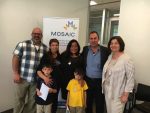From left to right: Rabbi Dan Moskovitz, Meha Qewas, the Hon. Jody Wilson-Raybould, Hesen Mostefa, Brenda Karp and two of the Mostefas’ children. (photo from Temple Sholom)
“I am not scared,” says Meha Qewas, sitting at her small dining table with her 1-year-old daughter on her lap. In front of us is a plate of knefa, a very rich, sweet cheese dish covered in syrup, together with huge tumblers of juice many times bigger than what I’m used to being offered. Meha clearly values hospitality. The only thing sweeter than the mid-morning “snack” is the ebullience and warmth that flows out of Meha and her husband Hesen Mostefa.
When she says she is fearless, Meha is talking about finding work in Vancouver. Despite the challenges, she is confident both in her new friends in the Vancouver Jewish community and in her own ability to master English and overcome whatever other obstacles she may meet. Her confidence is not groundless: Meha was the main force behind and organizer of getting her husband and three children first out of Syria, then out of Iraq, the country where they took refuge for five years. “I wanted my children out of there,” she says, recalling the sight of Syrian children and youth in Iraq taking up smoking and selling candy on the street to make income for their families in the packed, rat-infested refugee housing.
Hesen also has a remarkable story to tell. Trained as a surgeon in Syria, he volunteered in Iraq with Médecins Sans Frontières (Doctors Without Borders), which eventually hired him as a doctor. During the years they spent in Iraq, Hesen put in long days with MSF while Meha struggled to take care of the children, run a household and plan their flight from Iraq. Eventually, Meha succeeded in securing passage to Canada with the help of sponsors from Vancouver’s Temple Sholom.
Temple Sholom’s efforts to sponsor Syrian refugees started with a High Holidays sermon from Rabbi Dan Moskovitz about the refugees’ plight. Members of the shul immediately formed a committee of volunteers to bring in at least one family, and others, if possible.
Meetings with the Jewish Federation of Greater Vancouver and the Anglican Diocese followed (the diocese is a federally approved sponsor for refugees with which other groups can team). The committee learned about private sponsorship and began working through Mosaic, a local agency that serves newcomers and refugees, and were connected to the Mostefas. The process to bring them to Canada was started.
In December 2015, however, Canada pulled some immigration services out of Iraq and began working through Jordan. A letter that Moskovitz gave to Senator Mobina Jaffer about the Mostefa family and their situation apparently found its way to the prime minister, and services in Iraq were reinstated as a result.
“In the end, over 200 people from shul got involved,” Moskovitz said. “I met personally with anyone who expressed concern about whether bringing in the refugees was a good idea. Most got on board with the initiative and I’m happy to say that, now that they [the Mostefas] are here, everyone in the community is thrilled.”
The synagogue’s efforts did not end there. They have since brought in another family, Bawer Issa, Shinhat Ahmed and their newborn son. The Issa family was welcomed at a Shabbat service in the synagogue on Aug. 25 (it can be seen on YouTube). Bawer spoke movingly at that event, recounting how some people had asked him if he was surprised, as a Muslim, that he had been rescued by Jews.
“We were not surprised,” he told the congregation. “Growing up in Iraq, we were brainwashed at school every day to hate Israelis and Jews as our number one enemy. My Kurdish father always told us not to care what they said, not to believe it. He told us that Israel had been the first to send aid when Saddam Hussein bombed us with chemical weapons.” Citing Israel’s continued support for Kurdish self-rule, Bawer said that he had already known that Jews were their friends.
At the upcoming biennial meeting in Boston of the Central Conference of American Rabbis, the umbrella organization of the Reform movement, a resolution – that Moskovitz helped write – will call for the sponsorship of 36 more refugee families by Canadian congregations.
The wider Vancouver community is invited to welcome the Issa and Mostefa families on Sept. 10, at 11:30 a.m., at a reception at Temple Sholom that also marks the first day back of the synagogue’s Hebrew school. An RSVP is requested to 604-266-7190 or via templesholom.ca/get-know-new-canadians.
Matthew Gindin is a freelance journalist, writer and lecturer. He writes regularly for the Forward and All That Is Interesting, and has been published in Religion Dispatches, Situate Magazine, Tikkun and elsewhere. He can be found on Medium and Twitter.

